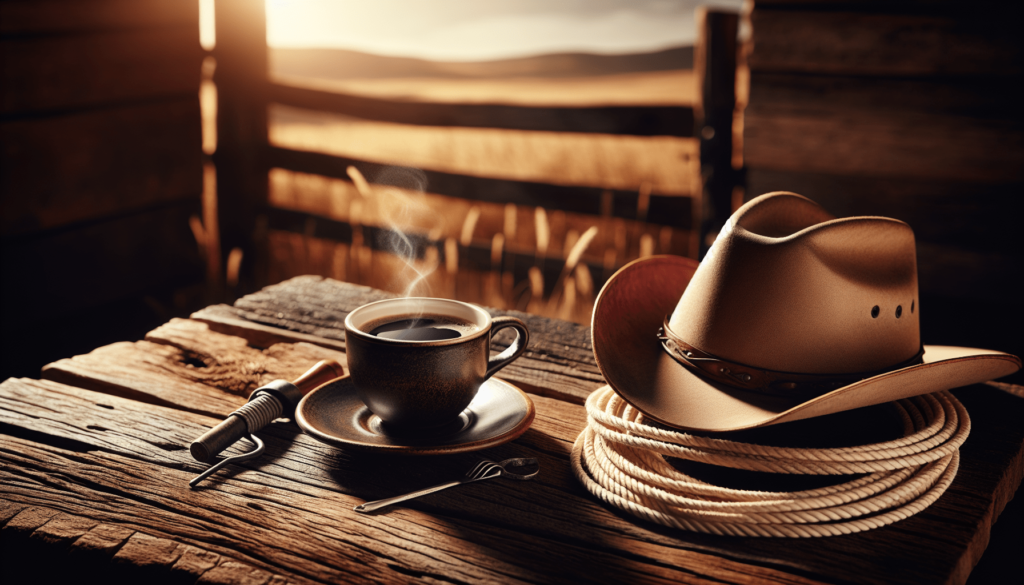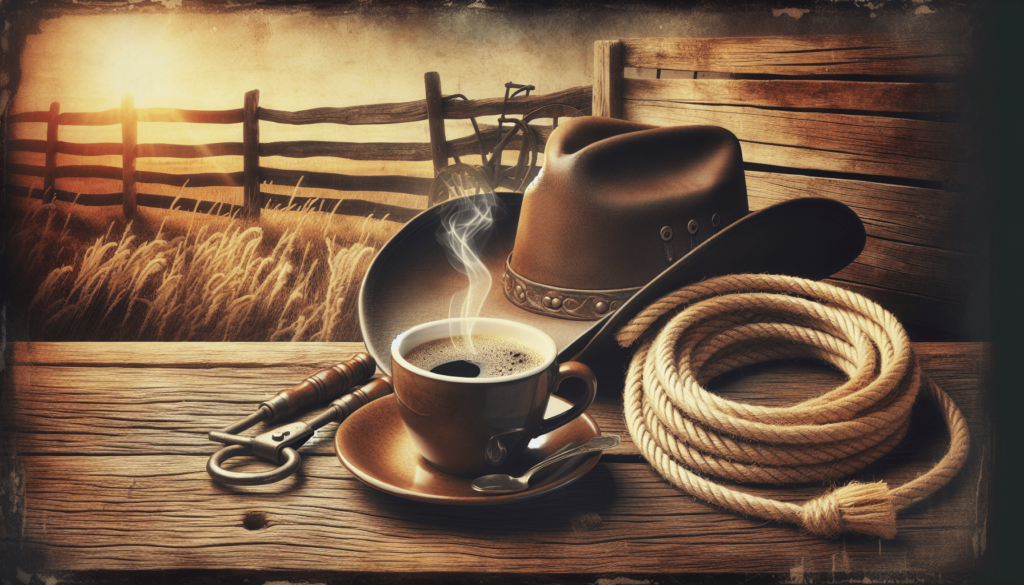Did you ever wonder what makes the coffee of a cowboy so special? Understanding the secrets behind cowboy coffee can give you an appreciation for simplicity and resourcefulness. Let’s journey back to the rugged, open plains and explore how cowboys managed to brew a perfect cup of coffee amidst their wild adventures.
The Origins of Cowboy Coffee
Cowboy coffee has roots deep in American history, particularly tied to the Old West’s era. Cowboys relied on this strong, straightforward brew to keep them energized during grueling cattle drives.
Historical Context
The origin of cowboy coffee can be traced back to the mid-1800s when cattle drives from Texas to Kansas were significant. Cowboys needed a reliable, simple method to prepare coffee that was both energizing and easy to make with limited resources. Boiling ground coffee in kettles or pots directly over the campfire led to the creation of cowboy coffee.
The Importance of Coffee for Cowboys
Coffee wasn’t just a luxury; it was a necessity. It kept cowboys alert during long nights and provided comfort during cold mornings. Brewed in the most primitive yet effective way, cowboy coffee became a staple in the diet of these hard-working men.
The Cowboy Coffee Recipe
Cowboy coffee is lauded for its simplicity, but don’t let that fool you into thinking it’s basic. The method requires a bit of finesse to get it just right.
Basic Cowboy Coffee Ingredients
- Coffee Grounds: Coarsely ground coffee is ideal.
- Water: Clean, fresh water is crucial.
- Some Extras: A pinch of salt or eggshells for those in-the-know cowboy touches.
Step-by-Step Brewing Process
Here’s a straightforward way to make cowboy coffee:
- Boil the Water: Start by bringing water to a rolling boil over a campfire or stove.
- Add the Coffee Grounds: For every cup of water, add about one heaping tablespoon of coffee grounds.
- Stir and Boil Again: Stir briefly and bring the mixture back to a boil.
- Reduce Heat and Steep: Reduce the heat and let it steep for about five minutes.
- Add Extras: Drop a pinch of salt or crushed eggshells to help settle the grounds.
- Pour and Enjoy: Slowly pour the coffee into your cup to avoid the grounds.
Below is a simple representation to summarize the recipe:
| Step | Action | Tips |
|---|---|---|
| 1 | Boil the Water | Use fresh, clean water. |
| 2 | Add the Coffee Grounds | Use coarsely ground coffee. |
| 3 | Stir and Boil Again | Stir briefly to mix. |
| 4 | Reduce Heat and Steep | Steep for about five minutes. |
| 5 | Add Extras | Optional: pinch of salt or eggshells. |
| 6 | Pour and Enjoy | Pour slowly to avoid grounds. |

Secrets in the Pot: Ingredients and Additions
Cowboys had limited resources, yet they found creative ways to enhance their coffee.
Using Salt
A small pinch of salt can reduce the bitterness of the brew, making it smoother and more enjoyable. Salt’s chemical properties help neutralize acids in coffee, producing a balanced flavor.
The Surprising Role of Eggshells
Eggshells served a dual purpose: they helped reduce acidity and settled the grounds at the bottom of the pot. To use eggshells, simply crush a cleaned eggshell and add it to the coffee grounds before brewing.
Sugar and Fatting Up the Coffee
Sugar and fat, such as bacon grease, were occasionally added for an extra calorie boost. These ingredients made the coffee richer and provided needed energy for the strenuous work.
Tools of the Trade: Coffee Gear for Cowboys
Cowboys relied on simple yet effective tools to make their coffee.
The Ubiquitous Coffee Pot
Most often, cowboys used large tin or enamel pots to brew their coffee. These vessels were durable and could withstand the harsh conditions of the trail.
Cowboy Cups
Tin cups were preferred for their durability and light weight. The ruggedness of these cups meant they could handle being tossed around without breaking.
Grind Size
While today’s baristas focus heavily on precise grind sizes, cowboys used a coarse grind, which suited the boiling method and made it easier to strain out the grounds.

Modern Interpretations of Cowboy Coffee
Today, many coffee enthusiasts are reviving the cowboy coffee method, adding a nostalgic and rustic appeal to outdoor adventures.
Cowboy Coffee in Campgrounds
Perfect for camping trips, cowboy coffee eliminates the need for electric coffee makers or complicated equipment. All you need is a fire, water, coffee, and a pot.
Adding a Modern Twist
Some modern twists might include using gourmet coffee beans or utilizing flavored salts. These small adjustments can enhance the experience while preserving the traditional method’s integrity.
Step-by-Step with Modern Gadgets
While true cowboy coffee sticks to the basics, some might use a portable coffee grinder to ensure freshly ground coffee, adhering to the cowboy spirit but with a modern touch.
Common Mistakes and How to Avoid Them
Over-Boiling the Coffee
Boiling too long can make the coffee overly bitter. Pay attention to the brew time and avoid extended boiling.
Not Letting Grounds Settle
If you pour too quickly, you’ll end up with a mouthful of coffee grounds. Allow enough time for the grounds to settle before pouring.
Skipping the Extras
While optional, adding a pinch of salt or eggshells can improve the taste and reduce bitterness. Don’t overlook these simple but effective tricks.
The Cultural Impact of Cowboy Coffee
Cowboy coffee isn’t just a method; it’s a symbol of resilience, simplicity, and the American spirit.
Cowboy Coffee in Literature and Film
You can find references to cowboy coffee in numerous books and movies, reflecting its importance in the cowboy ethos. It represents not just a drink but a connection to heritage and tradition.
Family Traditions
For some, making cowboy coffee has become a family tradition, passed down through generations and serving as a way to connect with the past.
Influence on Modern Coffee Culture
Even in the sophisticated world of coffee today, the essence of cowboy coffee endures. Its emphasis on simplicity and quality resonates with coffee lovers everywhere.
Cowboy Coffee Variations from Around the World
The simplicity of cowboy coffee has inspired variations globally, each with a unique twist while sticking to the fundamental principles of simplicity and resourcefulness.
Kava from the Balkans
In Balkan countries, a traditional method similar to cowboy coffee called “kava” involves boiling finely ground coffee with water and sometimes adding sugar.
| Region | Name | Key Ingredients |
|---|---|---|
| Balkans | Kava | Finely ground coffee, water, sometimes sugar |
Campfire Coffee in Scandinavia
Scandinavians have their version of cowboy coffee, commonly referred to as campfire coffee. This method is similar but often includes the addition of a twig of birch for a unique flavor.
| Region | Name | Key Ingredients |
|---|---|---|
| Scandinavia | Campfire Coffee | Coarsely ground coffee, water, birch twig |
Argentina’s Mate Cocido
Though primarily a tea-drinking culture, some Argentinians apply a similar brewing method for mate, a traditional South American drink, involving boiling water with ground yerba leaves.
Health Aspects of Cowboy Coffee
While cowboy coffee is delicious, it’s wise to understand its impact on health.
Benefits
- Energy Boost: Packed with caffeine, it’s perfect for an energy boost.
- Simple Ingredients: Minimal additives make this a pure way to consume coffee.
Considerations
- Acidity: Cowboy coffee can be acidic, which might be challenging for those with sensitive stomachs.
- Caffeine Content: It’s strong, so moderate consumption is advisable.
Tips for Enjoying Cowboy Coffee Today
Integrate the essence of cowboy coffee into your daily routine with these practical tips.
Embrace the Ritual
Take the time to enjoy making your coffee. The slow, deliberate process can be meditative, allowing you to start your day mindfully.
Experiment with Flavors
Try adding different natural flavors like cinnamon or nutmeg. Though not traditional, it can add a personal twist to your cowboy coffee experience.
Outdoor Adventures
Bring a piece of cowboy tradition to your next camping trip. Making coffee over an open flame connects you with nature and history in a profound way.
Small Gatherings
Impress friends or family by making cowboy coffee during an outdoor gathering. Share the history behind it, adding a storytelling aspect to your brew.
Using Modern Tools
Even at home, you can use modern tools like a gas stove or kettle to replicate the cowboy coffee method, keeping the spirit while ensuring convenience.
Conclusion
By understanding cowboy coffee and its history, you can better appreciate the resourcefulness and spirit of the Old West. The next time you’re brewing coffee, consider adopting some secrets from the cowboys. Whether it’s adding a pinch of salt or perfecting your boiling technique, these small touches can transform your coffee experience. So, why not try making cowboy coffee and enjoy a taste of history in every sip?
